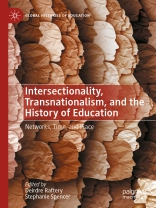This volume brings together a diverse range of contributors to explore the significance of intersectionality and transnationalism, with reference to the history of education. The chapters cover a range of educational spaces and places and demonstrate the possibilities that theoretical approaches can offer to scholars at all levels of their academic career. The chapters focus specifically on women’s activism in order to maintain a coherent framework of research that is brought together in an introduction and concluding thoughts. The significance of gender as relational and a symbol of power ensures that men and masculinities are not overlooked but recognized as integral to understanding gender dynamics as they affected women’s education and the ways in which that education took place.
Daftar Isi
Chapter 1. Intersectionality, Transnationalism and the History of Education: Introduction.- Chapter 2. From Local to Transnational Discrimination and Privilege: Intersectionality and an Educational Network of the Late Nineteenth and Early Twentieth Centuries.- Chapter 3. Muriel Pelham-Johnson in Tanganyika Territory (1939-1959): Imperial Networks and Local Rooting in the Shaping of Girls’ Schooling Policies.- Chapter 4. Transnational Time and Place between East and West: Shimoda Utako and Intertwined Ideals of Women’s Education in Modern Japan, 1868-1936.- Chapter 5. “True Stars in the East”: Engendering Faith and Educational Networks in the American School for Girls in Iraq, 1920s-1950s.- Chapter 6. Shaping the Women Question to Enter the Revolution: Women’s Production of Knowledge in the Ethiopian Student Movement (1972-1976).- Chapter 7. Networks on Home Economics in Early 1900s Scandinavia and their Discourses of Being a Good Woman.- Chapter 8. Gender and Intersectionality: Female Strategies in the Teaching Profession in Brazil During the First Half of the 20th Century.- Chapter 9. Transnational Networking and Female Education: Loreto Convent Schooling, 1840-1910.- Chapter 10. Minette Jee’s Working life as a British Educator in the Mid-twentieth Century.- Chapter 11. Crossing Boundaries and Negotiating Identities: the Politics of Secondary Education for Chinese Girls in Interwar Hong Kong.- Chapter 12. Transnationalism, Intersectionality and the History of Education: Themes and Perspectives.
Tentang Penulis
Deirdre Raftery is Full Professor (History of Education) at the School of Education, University College Dublin, Ireland. An elected Fellow of the Royal Historical Society, she is a historian of education, with over a dozen book publications. She has held a Fulbright (Boston College), and visiting fellowships at the University of Oxford, the University of Toronto, the University of Notre Dame, and Durham University. She is currently a Visiting Research Fellow, at the University of Cambridge.
Stephanie Spencer is Professor Emerita at the University of Winchester, UK. She has taught gender and education history for over twenty years and plays an active part in the Centre for the History of Women’s Education at Winchester which she co-founded.












